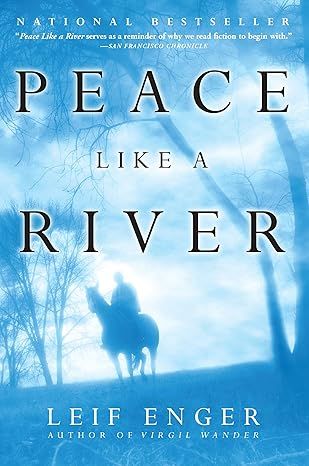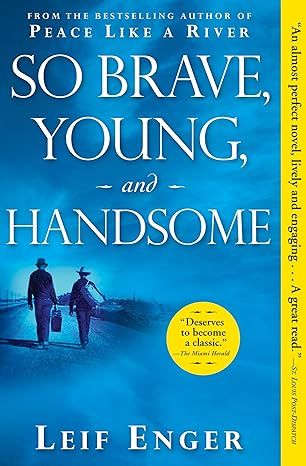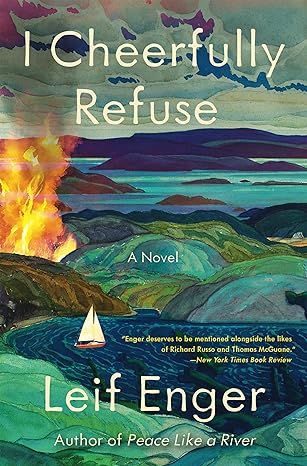Peace Like a River: A Novel
4.4
-
5,951 ratings
A “reminder of why we read fiction to begin with” (San Francisco Chronicle), Peace Like a River is Leif Enger’s extraordinary debut novel—a heroic quest, a tragedy, a love story, and a haunting meditation on the possibility of magic in the everyday world—with over one million copies sold
Raised on tales of cowboys and pirates, eleven-year-old Reuben Land has little doubt that miracles happen all around us, and that it’s up to us to “make of it what we will.” Reuben was born with no air in his lungs, and it was only when his father, Jeremiah, picked him up and commanded him to breathe that his lungs filled. Reuben struggles with debilitating asthma from then on, making him a boy who knows firsthand that life is a gift, and also one who suspects that his father is touched by God and can overturn the laws of nature.
The quiet Midwestern life of the Lands is upended when Davy, the oldest son, kills two marauders who have come to harm the family; unlike his father, he is not content to leave all matters of justice in God’s hands. The morning of his sentencing, Davy–a hero to some, a cold-blooded murderer to others–escapes from his cell, and the Lands set out in search of him. Their journey is touched by serendipity and the kindness of strangers–among them a free spirit named Roxanna, who offers them a place to stay during a blizzard and winds up providing them with something far more permanent. Meanwhile, a federal agent is trailing the Lands, convinced they know of Davy’s whereabouts.
With Jeremiah at the helm, the family covers territory far more extraordinary than even the Badlands where they search for Davy from their Airstream trailer. Sprinkled with playful nods to biblical tales, beloved classics such as Huckleberry Finn, the adventure stories of Robert Louis Stevenson, and the westerns of Zane Grey, Peace Like a River unfolds like a revelation.
Read more
Kindle
$8.66
Available instantly
Audiobook
$0.00
with membership trial
Hardcover
$17.26
Paperback
$9.12
Ships from
Amazon.com
Payment
Secure transaction
ISBN-10
0802139256
ISBN-13
978-0802139252
Print length
320 pages
Language
English
Publisher
Atlantic Monthly Press
Publication date
November 30, 2007
Dimensions
5.5 x 0.75 x 8.25 inches
Item weight
12.8 ounces
Product details
ASIN :
B0062A4882
File size :
1995 KB
Text-to-speech :
Enabled
Screen reader :
Supported
Enhanced typesetting :
Enabled
X-Ray :
Enabled
Word wise :
Enabled
Editorial reviews
Praise for Peace Like a River
New York Times Bestseller
A Time Magazine Top Five Book of the Year
A Los Angeles Times, Christian Science Monitor, and Denver Post Best Book of the Year
"Leif Enger . . . is a natural-born storyteller, and his novel moves in a current that can be poetic and slow or as tumultuous as whitewater rapids. This novel has the power to convince that, despite sorrow, human experience is a miracle of ordinary truth and extraordinary love." -Atlanta Journal-Constitution
"A rich mixture of adventure, tragedy, and healing ... a journey you simply must not miss." -Christian Science Monitor
"What allows Peace Like a River to transcend any limitations of belief and genre is its broad, sagacious humanity . . . There is magic here, none more potent than Enger's prose."-Newsday
“Peace Like a River serves as a reminder of why we read fiction to begin with.” —San Francisco Chronicle
“If you like a ripping good story told in robust prose that gives you goose bumps, latch onto this book – more than a novel of miracles, it is truly a miraculous novel.” —The Seattle Times
“You don’t see novels like this one very often. Peace Like a River reminds a reader of Kent Haruf’s Plainsong or even Norman MacLean’s A River Runs Through It. It’s got that pure American loss of innocence theme, that belief in and fascination with miracles, that insistence on the goodness of men outside of the law.” —Los Angeles Times Book Review
“A compelling blend of traditional and artfully offbeat storytelling . . . a miracle well worth witnessing . . . Grade: A.”—Boston Globe
“If ever there was a time for a novel of faith and redemption–a quiet book of old-fashioned verities–this is it. —New York Post
Read more
Sample
Clay
From my first breath in this world, all I wanted was a good set of lungs and the air to fill them with—given circumstances, you might presume, for an American baby of the twentieth century. Think about your own first gasp: a shocking wind roweling so easily down your throat, and you still slipping around in the doctor’s hands. How you yowled! Not a thing on your mind but breakfast, and that was on the way.
When I was born to Helen and Jeremiah Land, in 1951, my lungs refused to kick in.
My father wasn’t in the delivery room or even in the building; the halls of Wilson Hospital were close and short, and Dad had gone out to pace in the damp September wind. He was praying, rounding the block for the fifth time, when the air quickened. He opened his eyes and discovered he was running—sprinting across the grass toward the door.
“How’d you know?” I adored this story, made him tell it all the time.
“God told me you were in trouble.”
“Out loud? Did you hear Him?”
“Nope, not out loud. But He made me run, Reuben. I guess I figured it out on the way.”
I had, in fact, been delivered some minutes before. My mother was dazed, propped against soggy pillows, unable to comprehend what Dr. Animas Nokes was telling her.
“He still isn’t breathing, Mrs. Land.”
“Give him to me!”
To this day I’m glad Dr. Nokes did not hand me over on demand. Tired as my mother was, who knows when she would’ve noticed? Instead he laid me down and rubbed me hard with a towel. He pounded my back; he rolled me over and massaged my chest. He breathed air into my mouth and nose—my chest rose, fell with a raspy whine, stayed fallen. Years later Dr. Nokes would tell my brother Davy that my delivery still disturbed his sleep. He’d never seen a child with such swampy lungs. When Dad skidded into the room, Dr. Nokes was sitting on the side of the bed holding my mother’s hand. She was wailing—I picture her as an old woman here, which is funny, since I was never to see her as one—and old Nokes was attempting to ease her grief. It was unavoidable, he was saying; nothing could be done; perhaps it was for the best.
I was lying uncovered on a metal table across the room.
Dad lifted me gently. I was very clean from all that rubbing, and I was gray and beginning to cool. A little clay boy is what I was.
“Breathe,” Dad said.
I lay in his arms.
Dr. Nokes said, “Jeremiah, it has been twelve minutes.”
“Breathe!” The picture I see is of Dad, brown hair short and wild, giving this order as if he expected nothing but obedience.
Dr. Nokes approached him. “Jeremiah. There would be brain damage now. His lungs can’t fill.”
Dad leaned down, laid me back on the table, took off his jacket and wrapped me in it—a black canvas jacket with a quilted lining, I have it still. He left my face uncovered.
“Sometimes,” said Dr. Nokes, “there is something unworkable in one of the organs. A ventricle that won’t pump correctly. A liver that poisons the blood.” Dr. Nokes was a kindly and reasonable man. “Lungs that can’t expand to take in air. In these cases,” said Dr. Nokes, “we must trust in the Almighty to do what is best.” At which Dad stepped across and smote Dr. Nokes with a right hand, so that the doctor went down and lay on his side with his pupils unfocused. As Mother cried out, Dad turned back to me, a clay child wrapped in a canvas coat, and said in a normal voice, “Reuben Land, in the name of the living God I am telling you to breathe.”
The truth is, I didn’t think much on this until a dozen years later—beyond, of course, savoring the fact that I’d begun life in a dangerous and thus romantic manner. When you are seven years old there’s nothing as lovely and tragic as telling your friends you were just about dead once. It made Dad my hero, as you might expect, won him my forgiveness for anything that he might do forever; but until later events it didn’t occur to me to wonder just why I was allowed, after all, to breathe and keep breathing.
The answer, it seems to me now, lies in the miracles.
Let me say something about that word: miracle. For too long it’s been used to characterize things or events that, though pleasant, are entirely normal. Peeping chicks at Easter time, spring generally, a clear sunrise after an overcast week—a miracle, people say, as if they’ve been educated from greeting cards. I’m sorry, but nope. Such things are worth our notice every day of the week, but to call them miracles evaporates the strength of the word.
Real miracles bother people, like strange sudden pains unknown in medical literature. It’s true: They rebut every rule all we good citizens take comfort in. Lazarus obeying orders and climbing up out of the grave—now there’s a miracle, and you can bet it upset a lot of folks who were standing around at the time. When a person dies, the earth is generally unwilling to cough him back up. A miracle contradicts the will of earth.
My sister, Swede, who often sees to the nub, offered this: People fear miracles because they fear being changed—though ignoring them will change you also. Swede said another thing, too, and it rang in me like a bell: No miracle happens without a witness. Someone to declare, Here’s what I saw. Here’s how it went. Make of it what you will.
The fact is, the miracles that sometimes flowed from my father’s fingertips had few witnesses but me. Yes, enough people saw enough strange things that Dad became the subject of a kind of misspoken folklore in our town, but most ignored the miracles as they ignored Dad himself.
I believe I was preserved, through those twelve airless minutes, in order to be a witness, and as a witness, let me say that a miracle is no cute thing but more like the swing of a sword.
If he were here to begin the account, I believe Dad would say what he said to Swede and me on the worst night of all our lives:
We and the world, my children, will always be at war.
Retreat is impossible.
Arm yourselves.
Read more
About the authors
Leif Enger
Leif Enger worked as a reporter and producer for Minnesota Public Radio for nearly twenty years before leaving to write fiction full-time. He lives in Minnesota with his wife Robin.
Reviews
Customer reviews
4.4 out of 5
5,951 global ratings
L. Quido
5
The Minnesota "tall tale" gets a modern twist....
Reviewed in the United States on February 11, 2004
Verified Purchase
Leif Enger becomes a lightning rod for praise and blame in "Peace Like A River". Judging just from the reviews on this site, you can either wax rhapsodic about his tale, or just view it as contemporary claptrap. Leif Enger, in his first novel, couldn't be more Minnesotan. Raised on Minnesota farm, he lives as an adult on a farm in a quintessential small town of the hinterland, with his wife and children. For most of his adult career, prior to the release of "Peace Like a River" he worked for Minnesota Public Radio (which also begat Garrison Keillor). Like Keillor, Enger looks for beauty in the simple way of life around him, and roots it in the family. But other comparisons do no justice to either man. So, too, has Enger's novel been compared to "To Kill a Mockingbird", mostly because the narration is through the eyes of a child, who is telling the story as an adult. Symbolism and the discovery of one's parents' true nature are themes for Enger, as much as they were for Lee. But Enger does strike out into new territory with "Peace Like a River" -- he captures the charm and folk wisdom of the Minnesota "tall tale", and sets it in a relatively contemporary setting - 1962 in the heartland. More successful at weaving Christian mysticism and the appearance of miracles into his narrative than say, contemporary writers such as Dean Koontz, Leif Enger brings a true talent for rich prose and unsettling questions to his tale. Synopsis of the plot: Born an asthmatic, Reuben Land's first miraculous event was finally beginning to breathe after several minutes of stillness, when his father, Jeremiah, orders him to breathe in the name of the living God. Reuben is raised by his father, with older brother Davy and younger sister Swede. Abandoned at a young age by their mother, Reuben and his siblings grow up in a way that many children who feel abandoned do - they develop skills and thoughts far more mature than is normal for their age. In this family, most of the precociousness is drawn in 9-year old Swede, who commands language and vocabulary far above that of most adults. Swede's interest in all things western form the story's backdrop, as she writes lyric poetry with a larger than life character, Sunny Sundown. From Reuben's point of view, his early life, is as a spectator, watching his dad perform miracles and overturn the laws of nature. It is left to the reader to divine whether the miracles do occur, or are just what they are in the viewpoint of a small boy who witnesses over and over how Jeremiah pulls his family together with faith and love. In a search for Reuben's older brother, Jeremiah confronts obstacles and seemingly performs feats which make the obstacles disappear. Are they really miracles, or do they feel as such to a scared, eleven year-old boy? It is evident that Jeremiah's strong belief in God and his ability to connect to God to protect and provide for his family are the driving force behind the Land family's ability to find Davy, and to find comfort in the circle of a woman named Roxanna. In the tale, Enger also draws a villain named `Jape', like Koontz's villains, almost a caricature of Satan. What comes to prevent the most tragic of fates, and lends a remarkable conclusion to the tale, is best left to the reader to pursue. Enger adds rich texture to the tale by the quality of his prose. He can invoke memories from me of the land and the beauty and fear of a child when coming of age. His faith is simple and strong, and from it he envisions the miracles that Jeremiah performs to keep his family together. Forces of nature (blizzards, fires) conspire to give you the feeling that you are truly being transported to the wild west, a land where people need to come to terms with how to live around what nature puts in their path. And, like Harper Lee, Enger is able to get inside the mind of a child, and put forth a child's vision and wishes into contemporary terms as they focus their desires through toys and activities. Less of an adventure story than a tale to reinforce the value of a strong family, I think Enger's novel is somewhat miraculous in and of itself, a surprising journey into emotions you felt as a child, and have since forgotten. It feels as though there is at least some of the autobiographical in Enger's novel. Read it, delight in it!
Read more
39 people found this helpful
joelandanna
5
A book I love so much I have shared over and over.
Reviewed in the United States on January 23, 2024
Verified Purchase
I am an avid and eclectic reader, and this is one of my very favorite books. Leif Enger takes his time and brings forth a beautiful story with rich characters and writing that is even better on re-reading. Jeremiah Land lives his life according to a different story. He is a true hero armed with joy, patience, life, and healing rather than physical strength used to bring harm. There are so many layers, and I love experiencing it all through the lens of the flawed and humble witness, Ruben. I could go on and on. This is a book that makes me want to write, which, after reading this review, you may think a dangerous and ill-advised undertaking. Beautiful prose, rich characters, and a life-giving story, a book I have loved and shared over and over.
Read more
11 people found this helpful
Bruce J. Wasser
5
majestic hymn to family strength, faith, personal integrity
Reviewed in the United States on October 11, 2002
Verified Purchase
Leif Enger's stunning debut novel, "Peace like a River," is part hymn, part epic myth and part lament to an American past in which individual virtue and steadfastness of faith elevate men and women. Enger has described a world of faith, one in which an asthmatic child savors religious truth, tangible miracles and ironclad trust in a father whose love for his children is eclipsed only by his devotion to his God. The characters who populate "Peace" become living symbols while at the same time gracefully engaging us in their physical, moral and spiritual struggles. The physical environment of this bighearted novel is uninviting. Wintry Minnesota and North Dakota provide appropriate physical challenges to the Land family, which must adapt to a crucial decision made by the oldest son Davy. That decision, to pursue a violent, but just, resolution to two miscreants who terrorize the Land family, compels Davy to flee and the remnants of his family to pursue. This quest, both temporal and spiritual, is the heart of the novel, and the author probes themes of family coherence, justice, truth, redemption, and faith with quiet, perfect timbre. Enger is a magnificent writer, whose narrative abilities alone make "Peace" worth reading. However, it is his characterization of the Land family which transforms his novel. The narrator, Reuben Land, an eleven-year-old asthmatic boy, defines our perspective and never permits his adult recollections of the events of his childhood to interfere with an authentic, often painful, recounting of his participation in the central action of the novel, the discovery of his "outlaw" brother. While Reuben discounts his own ability to understand and interpret events, he never underestimates the talents of his sister, Swede, who emereges as an enormously sympathetic young woman. It is Swede's penchant for poetry, symbolism and subtelty that enriches our understanding of the enormous pressures and conflicts the children experience basking in the presence and shivering in the shadow of their father. Much like the novel, Jeremiah Land has a "foundation...laid in prayer and sorrow." Through Swede's eyes, he emerges as either a full-blown Homeric hero or the living embodiment of a champion of justice of the Old West. Readers will recognize his afflictions as similar to Job, and Jeremiah gains stature as he is seemingly purified by God's many painful tests of his faith. From the onset of the novel, readers glimpse the impossible occurring through Jeremiah's intervention. He literally breathes life into his newborn son; he survives a tornado; during prayer, he walks on air. These miracles pale in comparison to the one he hopes to achieve with and through his family as they search for Davy. A major triumph of the novel is Enger's unwillingness to permit his writing to become predicatable or saccharine. Instead the bulk of the novel forces readers to either suspend their own disbelief or submerge their own skepticism. In a moving afterword, Leif Enger pays homage to his father, who "believes in vivid narration," and his mother, "who writes better letters than anyone since the Apostle Paul." The author is a living representation of the values he extols in his parents. "Peace like a River" deserves the widest audience. Its unabashed belief in the integrity of the human spirit, its bighearted acceptance of the possibility of miracles and its loving evocation of family love and truth intermingle. This is a novel worth reading, savoring and sharing.
Read more
11 people found this helpful
Top Leif Enger titles
View allSimilar Books
Best sellers
View all
The Tuscan Child
4.2
-
100,022
$8.39

The Thursday Murder Club: A Novel (A Thursday Murder Club Mystery)
4.3
-
155,575
$6.33

Sapiens: A Brief History of Humankind
4.6
-
140,302
$13.49

The Butterfly Garden (The Collector, 1)
4.3
-
88,556
$9.59

Things We Hide from the Light (Knockemout Series, 2)
4.4
-
94,890
$11.66

The Last Thing He Told Me: A Novel
4.3
-
154,085
$2.99

The Perfect Marriage: A Completely Gripping Psychological Suspense
4.3
-
143,196
$9.47

The Coworker
4.1
-
80,003
$13.48

First Lie Wins: A Novel (Random House Large Print)
4.3
-
54,062
$14.99

Mile High (Windy City Series Book 1)
4.4
-
59,745
$16.19

Layla
4.2
-
107,613
$8.99

The Locked Door
4.4
-
94,673
$8.53









